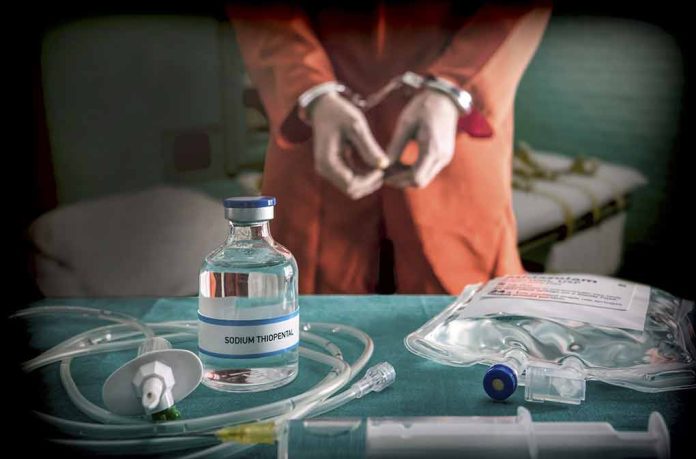
Joseph Corcoran’s execution at Indiana State Prison marks the state’s first in 15 years, reigniting debates on the death penalty’s ethics and justification.
At a Glance
- Joseph Corcoran was executed in Indiana’s first execution in 15 years.
- He was convicted for the 1997 quadruple murder in Fort Wayne, Indiana.
- The execution revives debates on death penalty ethics.
- Religious groups and advocacy opponents protest execution.
The Execution Details
Joseph Corcoran, 49, was executed after being convicted for a 1997 quadruple murder that included his brother and sister’s fiancé among the victims. The execution, carried out by the sedative pentobarbital at Indiana State Prison in Michigan City, was witnessed by family members of the deceased and a reporter. This moment intensified ongoing debates on capital punishment ethics and legal processes in Indiana and beyond.
Corcoran’s conviction stems from the use of a semi-automatic rifle after reportedly hearing voices in his home. His execution concluded a prolonged legal battle with multiple reviews by both Indiana’s and the U.S. Supreme Courts, which consistently upheld his death sentence. Despite his lawyers’ challenges based on his mental health, arguing he suffered from paranoid schizophrenia, all appeals were ultimately dismissed.
Joseph Corcoran, convicted of the murder of four men in Fort Wayne in 1997, has been executed at the Indiana State Prison in Michigan City.
It was the state's first execution in more than 15 years. https://t.co/uN6L545WqW
— WTHR.com (@WTHRcom) December 18, 2024
Responses and Reactions
The execution triggered responses from various quarters. Indiana Attorney General Todd Rokita remarked that Corcoran “finally paid his debt to society as justice was provided to his victims.” Meanwhile, his sister stated on Facebook that the death penalty did not bring real justice, expressing forgiveness towards Corcoran. Religious groups and death penalty opponents voiced their dissent, while Governor Eric Holcomb emphasized adherence to legal statutes, citing the lengthy judicial review process Corcoran underwent.
In a poignant gesture, Corcoran requested Ben & Jerry’s ice cream as his last meal, embodying a stark juxtaposition to the gravity of his actions and the legal consequences. His last words, “Not really. Let’s get this over with,” further reflected his resigned acknowledgment of the situation. Corcoran’s execution has resumed after a hiatus, raising questions about capital punishment and its moral standing in modern society.
The Broader Impact
The execution of Joseph Corcoran sheds light on the complexities surrounding the death penalty. Indiana joins a national debate as state-level policies and opinions continue to evolve. A Republican legislator’s proposed bill to repeal the death penalty aligns with growing advocacy for alternatives. The case also highlights challenges in conducting executions, including drug shortages, and raises broader ethical questions about punitive justice’s effectiveness and humanity.
“Joseph Corcoran’s case has been reviewed repeatedly over the last 25 years – including 7 times by the Indiana Supreme Court and 3 times by the U.S. Supreme Court, the most recent of which was tonight. His sentence has never been overturned and was carried out as ordered by the court,” Gov. Eric Holcomb said in a statement.
As the state confronts these issues, Corcoran’s case remains a vivid illustration of the complex intersection between law, mental health, and moral judgment. Indiana’s decision reflects a strict adherence to the law, emphasizing justice for victims, yet the societal debate underscores the ongoing discomfort and ethical concerns surrounding capital punishment. The future of Indiana’s death row policies continues to hang in the balance as discussions progress.








